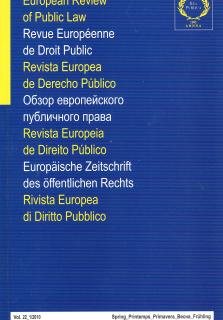
Les nouveaux territoires du droit constitutionnel
(The New Domains of Constitutional Law)
Professeur à l’Ecole de droit de la Sorbonne, Université Paris I,
Directeur du Centre de recherche de droit constitutionnel,
Président de l’Association française de droit constitutionnel
Until now confined to questions of political organisation and division of power and competences within the State, the constitutional law occupies, after the postwar period and according to a movement for growing development, new territories. This development was first the result of an increased jurisdictionalisation. In addition, it has correlatively been taken note of the fact that a Constitution does not only contain rules relating to the organisation of powers but it also constitutes a system of values that are embodied in what one would call the fundamental rights or the human rights. This conquest of the constitutional law has, however, come up with fierce competition from the rise of other legal systems, in particular on the European level, which tend to challenge the constitutional hegemony, not to say primacy. The constitutional law has thus brought about a double movement for regulation of the entire national legal field and of interest to the supranational legal systems, essentially European, that bring about for their part a reflection on the notions that were traditionally structuring it, that is sovereignty, democracy and separation of powers. The new fields of the constitutional law invite us to revisit the traditional fields of the constitutional law.
Jusqu’alors cantonné aux questions d’organisation politique et de répartition du pouvoir et des compétences au sein de l’Etat, le droit constitutionnel occupe, depuis l’après-guerre et selon un mouvement de développement croissant, de nouveaux territoires. Ce développement s’est d’abord traduit par une juridictionnalisation accrue. Par ailleurs, il a été corrélativement pris acte du fait qu’une Constitution ne contient pas seulement des règles relatives à l’organisation des pouvoirs mais aussi constitue un système de valeurs qui s’incarnent dans ce que l’on appellera les droits fondamentaux ou les droits de l’homme. Cette conquête du droit constitutionnel est cependant concurrencée par la montée en puissance d’autres systèmes juridiques, notamment au niveau européen, qui tendent à contester l’hégémonie, voire la primauté, constitutionnelle. Ainsi, le droit constitutionnel a opéré un double mouvement de régulation de l’ensemble du champ juridique national et d’intérêt pour les systèmes juridiques supranationaux, essentiellement européens, qui induisent en retour une réflexion sur les notions qui traditionnellement le structuraient, à savoir la souveraineté, la démocratie et la séparation des pouvoirs. Les nouveaux champs du droit constitutionnel invitent à revisiter les champs traditionnels du droit constitutionnel.





















